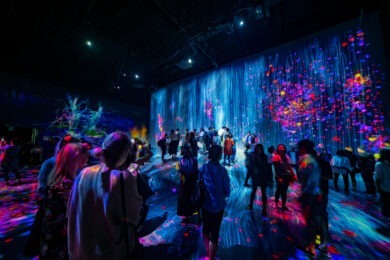Fresh air, challenge by choice and Aloha spirit make competition fun
With the world watching as international teams compete in Paris at this year’s Summer Olympics, sports-themed team-building activities are garnering more attention than ever. I spoke with Darlynne Menkin, owner of Out of the Ordinary Group & Team Adventures in San Diego, about team building and how to incorporate activities that require communication and strategy in a fun way.
She explained the benefits of competitive activations, “People get outdoors, which is very good. A lot of folks are sitting in offices and staring at computers. There’s something about being dressed in shorts and sneakers that really relaxes people and gets them out of the office atmosphere. Once [participants] meet up with us and relax and realize what is going on, that they won’t be embarrassed, that this is about fun, that’s when the magic happens.”
No Such Thing as Ordinary
Menkin and her company have been putting on Team Olympics since 1996, and she makes clear that Out of the Ordinary isn’t any kind of catchphrase. “We really do want to live up to our name. Just because we have a program in place, we aren’t going to just keep it like that. We are always trying to evolve our programs. We very often change up the games or add a little bit of a surprise element. We keep it fresh, as we have a lot of repeat clients, so we don’t always want to be doing the same thing,” she says.
Read More: Will the Paris Olympics Get the Gold from Meeting Profs?
When Work Becomes Play
Menkin finds a lot of joy in her work, and the notes of appreciation she receives weeks or even months after a Team Olympics event are evidence that she’s not the only one having a great time. “We always say team building is fun building. We just find that if we can get people having fun and laughing then we know that the team-building is going to naturally happen. There is no need to force anything.”
With that being said, there is always plenty to plan. I asked Menkin some key questions for those wondering about the process behind Olympics-themed team building.
How do you adapt sports like gymnastics, archery and tennis to be accessible to people who aren’t athletes?
As a team-building company, we’re all about bringing people together. So, when a corporate group requests a competitive, active program such as our Team Olympics, we give this a lot of thought because chances are good that not everyone is into sports. Or, there may be some people who don’t feel comfortable running or hitting a ball. Whenever we’re designing a program, it’s important to us that everyone feels comfortable…that they feel safe, and they don’t have any anxieties about looking bad or feeling embarrassed in front of their colleagues.
We do several things to put people’s minds at ease. First, we let them know we practice something called “challenge by choice.” We structure our programs as a team-building activity so that means each game (or challenge) typically requires several important roles. For instance, in our popular “Wiffle Ball Launch Challenge,” there are catchers (people catching the ball), launchers (people launching the ball using a slingshot) and retrievers (people gathering the balls and tossing them back to the launchers so they never run out of balls.)
And lastly, if someone doesn’t feel comfortable with any of these roles, they can be cheerleaders. We find that by structuring our games in this fashion, people are more receptive because they can choose how they want to contribute. As a general practice, we always make sure our games are designed for all fitness levels.
How do you use competitiveness as an advantage rather than a disadvantage for team building? In other words, how do you use competition to bring people together?
If it’s done the right way and with the right intentions, competition can foster collaboration and strengthen relationships. My family roots are Hawaiian, so we practice the “Aloha Spirit,” meaning everything we do, we do it in an encouraging and positive manner. When it comes to designing our games, they’re always team-oriented instead of individual contests.
Read More: Togetherness Through Team Building
We find that when people work together as a team, they’ll naturally bond over shared goals. We also train our staff to always be positive and to celebrate the efforts of all competitors, not just the winners. Finally, we believe you can never underestimate the power of play. If you can keep things fun, and your staff exuberates joy, the client is going to feel that.
How do you structure an awards ceremony that unites the team; how do you acknowledge the victor while also celebrating everyone?
Instead of simply announcing the winning team, we actually make it a point to talk about specific people on each team and how they stepped up for their team. If there’s time, I love incorporating my reporting skills where it’s more interactive and participants get to talk about what they enjoyed the most. For us, the awards are definitely more than just announcing the winning team. It’s about celebrating and recognizing the efforts of everyone.




